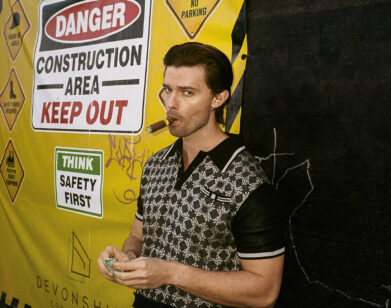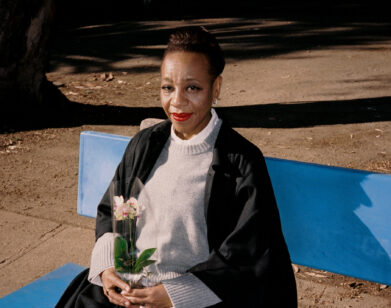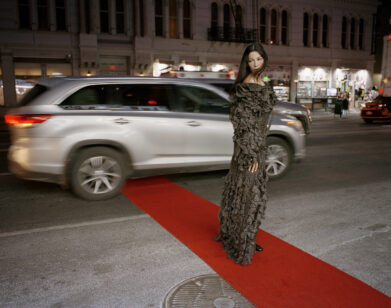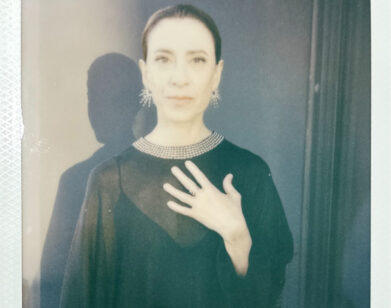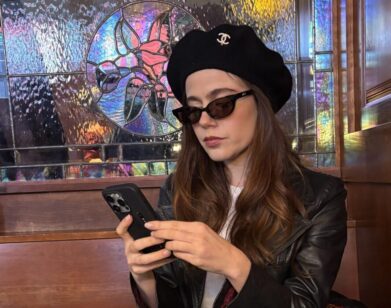The Agnostic
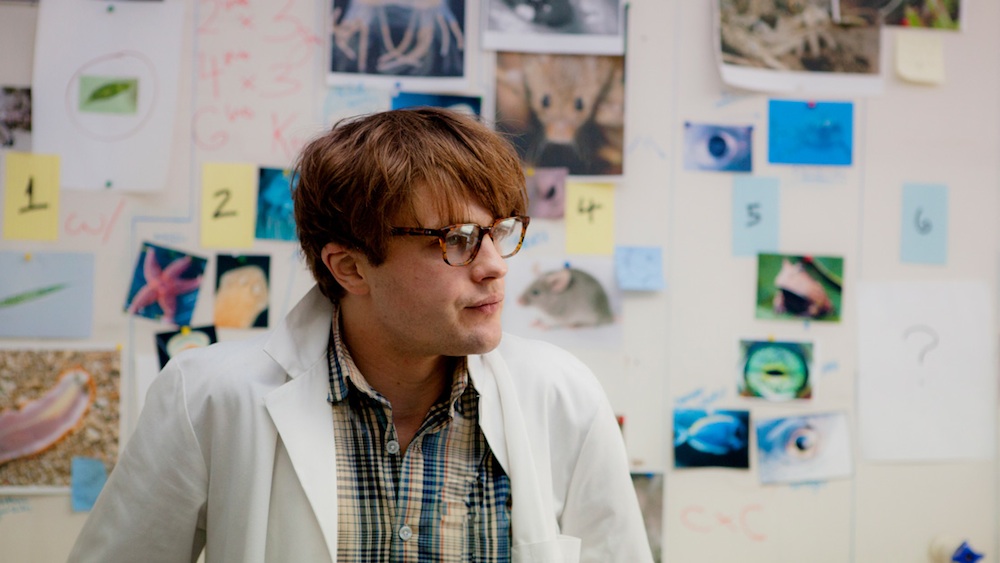
ABOVE: MICHAEL PITT IN I ORIGINS
Darwin, Richard Dawkins, and the Dalai Lama: one of these is not like the others. But Michael Pitt’s role in I Origins, a sci-fi-ish drama written and directed by Mike Cahill, required him to read up on all three. In the film, Pitt plays Ian, a Ph.D. candidate in evolutionary biology whose life’s work is to trace the development of the human eye. He wants to prove that it is not, as creationists call it, “irreducibly complex,” i.e., proof of an intelligent designer. Or rather, that is his life’s work until a series of bizarre coincidences force him to focus on something more spiritual. (This is where the Dalai Lama comes in.)
Joining Pitt in the cast is Astrid Bergès-Frisbey as Sofi, the foreign manic pixie dream girl who whispers in his ear about sixth senses and past lives. Brit Marling plays Karen, Ian’s diligent lab assistant-cum-wife who later helps him investigate those supernatural suggestions. Interested both in the personal motives behind Ian’s discovery and its global implications, the film probes a weird space between hard science and the soul.
ZACK ETHEART: How much evolutionary biology did you have to learn for the role?
MICHAEL PITT: [laughs] I tried to do as much as I could in the time that I had. It was fun. And it was really interesting. I didn’t get to go to much school when I was a kid for many reasons, so for me it was cool to be able to take this time and research something that you normally wouldn’t.
ETHEART: So how much time did you have to soak it all up?
PITT: It was very quick. From the moment that me and Mike met, we developed the film, and started shooting it, probably, if I had to guess, six months later. There was no script when I met him.
ETHEART: You’ve said that you only do movies that you would want to see. What got you interested in this project?
PITT: I think it’s a very interesting and fascinating subject that Mike is trying to touch upon. I think it’s very unique and I don’t think a lot of people do it. People separate the arts from science and he’s really trying to put them together. The truth is that the more that I talk to scientists and artists—ones that I respect—there isn’t this wall between them. There is a mutual respect there. So that’s fascinating to me.
ETHEART: It’s very interesting. They weren’t always so separate.
PITT: Right, right. I’m a fan of bringing that back. I hate walls. I think it’s a shame and I think you don’t touch upon things that you could touch upon when you make a wall. People say, “Well this is what I do, I’m a musician, and that is all I do.” The truth is that is not all you do. That is a fact, and that is not all that you have to offer. There is more unity there. If more people did that, there would be more appreciation for many different things.
ETHEART: How do you think a discovery like Ian’s would change the world?
PITT: In the same way that any discovery changes the world. Normally it’s done by brilliant scientists who are in search for truth and their quest is good, and then it’s thrown into society and people who are evil get their hands on it and use it for something horrible.
ETHEART: Ian’s relationships with Sofi and Karen are so different. How did you prepare for each of them?
PITT: Working with Brit was amazing and so organic. What we were really trying grab onto was how to not foreshadow their relationship. How can we show a powerful, powerful relationship without giving away too much about it, and just show a quiet understanding between two people who are kind of built for each other? With Astrid, developing the character—a lot of that was the polar opposite. It was about running the scene, never being afraid to just change it completely and make it sort of free and chaotic, which that type of love was for him.
ETHEART: You’re interested in trying directing at some point, right?
PITT: Yes, eventually.
ETHEART: What did you learn about filmmaking on this project?
PITT: You learn on every film. You learn a thousand lessons a day. What I learned on this project was—it’s a boring answer—that I want two cameras rolling all the time, like two or three all the time, so that I can cut seamlessly. It’s kind of a more new-school approach to shooting, and really the question is how simply you can do that without compromising the shots. The older view is that you can’t do it and still get good frames, good light, good performances. Mike was totally on that and executing it, and it works.
ETHEART: How was it shooting in India?
PITT: Amazing. I was there for about two and a half weeks. It was very intense. I think the most inspiring thing was the young actors. When I went there, the actor I was playing opposite to was just a little girl that they cast from an orphanage. She was my costar in India, so there were things she was teaching me and there were things that I was teaching her. Just a really, really inspiring experience.
ETHEART: Where do you position yourself between science and spirituality? It’s something that Ian struggles with throughout the film.
PITT: Yeah, it’s a hard question. I think that something I could say is this: if you ever look at Richard Dawkins, if you look at some of those debates on YouTube or something, they are fascinating. And even when he’s going too far, they are still fascinating. I realized that I still don’t know where I’m at, but that I am fascinated with the debate. I never get bored of talking about it or of playing the devil’s advocate. I think the debate is very, very important. For me, personally, Ian Gray is a character, and I loved playing this character. But me, I’m okay with not knowing some things. There are certain things I’m okay with not knowing.
ETHEART: What kind of things are you okay with not knowing?
PITT: Life after death.
ETHEART: When Sofi says to Ian, “Your door is almost closed,” a little while after they meet—what do you think she means?
PITT: I think that what she was doing was making a kind of metaphor for being open to the unknown. And the interesting thing about this film is that Ian, to be the scientist that he is, his whole job is to explain the unknown. And his whole job relies on having facts. As a scientist you spend eight years going in a direction, and you have no idea if at the end of those eight years your research is going to even pan out, but you have to be meticulous with your facts. I think that what she was saying was that if you want to experience a spiritual side, you have to be open for that in order to receive it.
For more from Sundance 2014, click here.

